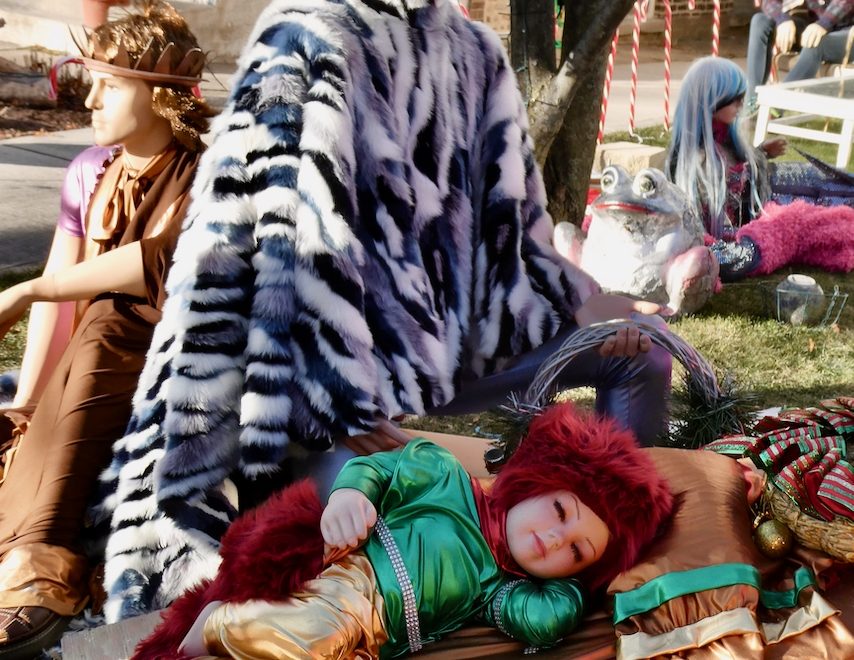The Tom Patterson Years: Cultural Adventures of a Fledgling Scribe, by Tom Patterson. Hiding Press/Jargon, 208 pages, 10 pages of photographs, 2021. ISBN 9781733709897. Paperback, $18 If you follow the literature of the folk/outsider/self-taught art field, then you know the name of Tom Patterson. He wrote the definitive book about Eddie Owens Martin/St. EOM and Pasaquan, and, with John Turner, the first major book about Howard Finster, among other achievements. Now he’s written a memoir that includes numerous interesting anecdotes from his encounters with Martin, Finster and other figures from the world of folk and outsider art, including the folklore professor
Continue readingCategory: Art environment
Jack Barker’s Metal Art Fantasyland
I don’t love junk metal art. The idea of turning scrap into art is usually better than the results. But occasionally a maker brings enough imagination and creativity to the work that it transcends its lawn-ornament origins. Tom Every and his epic Forevertron in Wisconsin is one of the more famous examples of this. Jack Barker, whose metal art filled his Essex, Illinois, yard, did not work on Every’s monumental scale — physically or conceptually — but his creations were if anything weirder than Dr. Evermore’s. Barker’s use of materials could be disconcerting, as could his imagery. The ways he
Continue readingWorld’s Largest Small-Town Collection of Big Things
Little Casey, Illinois, is in possession of a number of world’s largest things as certified by Guinness, which requires largest things to be at least theoretically functional. Accordingly, in addition to its largest things, the town also boasts quite a few just large things, which are at least as cool as the largest things even if not putatively functional. Why all the big things? A brilliant idea, it seems, to draw tourists to a small town of no particular distinction in the middle of downstate Illinois. And it works. We were there on an October Tuesday afternoon and there were
Continue readingHyde Park Lakefront Stone Carvings Under Threat
Chicago’s lakefront is lined with thousands of stone carvings, created by mostly anonymous makers over the course of the 20th century. One of its most carving-rich areas is also its most endangered. Hundreds, probably thousands, of carvings have been lost over the last 20 years as the city, in cooperation with the Army Corps of Engineers, has reconstructed its shoreline to prevent erosion and flooding. This has meant removal of limestone blocks once used to armor the shore — and thus also the carvings made on many of those same blocks. Now the city is moving ahead with plans to
Continue readingMorgan Shoal Stone Carvings: Imminent Danger
The hundreds of stone carvings at Morgan Shoal, between 45th and 50th Street in Chicago’s Hyde Park neighborhood, are in imminent danger of being lost. This section of lakefront is in terrible condition, with the many of the old rocks topsy turvy and falling into the lake. The city is following up emergency measures to reduce flooding with an initiative to fund its framework plan for complete reconstruction. The plan has appealing elements, including creation of additional parkland. However, it makes no reference to the carvings or their preservation, which is no surprise considering that public awareness of this artwork
Continue readingPromontory Point Stone Carvings Again Threatened
In the early 2000s the Hyde Park community succeeded (with then-Senator Obama’s help) in blocking a government plan to strip away the quarried step stones around Chicago’s Promontory Point and replace them with a new concrete-and-steel revetment. That important act of preservation incidentally saved the many stone carvings that reside on those blocks — several dozen of the thousands of the carvings that line Chicago’s waterfront. The concrete-and-steel approach to shoreline reconstruction was nonetheless applied from just north of Promontory Point up to Montrose Harbor. The “shoreline protection project” demolished several miles worth of the old step stones along with
Continue readingThe Cross Garden
W.C. Rice’s cross garden art environment in Prattville, Alabama, near Montgomery, was one of the nation’s fiercest roadside views. The drift of his message was crystal clear, although the specifics were sometimes arcane. Rice, whose cross fixation extended to the large wooden one he wore around his neck, was said to be quite friendly to visitors. His signs and crosses stretched along two sides of the road. On one side was a shed that served as a chapel. On the other the signs and crosses filled a large vacant lot below a hillside trailer park that Rice owned. The messages
Continue readingRoadside Art Tableaus
There are isolated bursts of brilliance all along Western Avenue and other working-class stretches of Chicago’s orderly street grid. And every once in a while you come across a building or a sales lot where the signmaker’s art gives way to something far more ambitious than a simple commercial illustration. Here are three examples — all gone now — where the signage adds up to a large-scale piece of art.
Continue readingThe Famous Bottle Cap Inn
Just added: a recently acquired Bottle Cap Inn postcard showing a different angle on the exterior. Click here for a full gallery of Bottle Cap Inn images, outside and in.
Continue reading
A Chicago Nativity In Spectacular Fashion
I’m as guilty as anyone of overusing the concept of “greatest ever,” but this nativity scene is a legitimate candidate for the title. A full-blown, if temporary, art environment, it is the work of retired fashion designer and cosmetologist Jim McCall. You can read about McCall and the site and see more photos in this Block Club Chicago story. More art environments here.
Continue reading